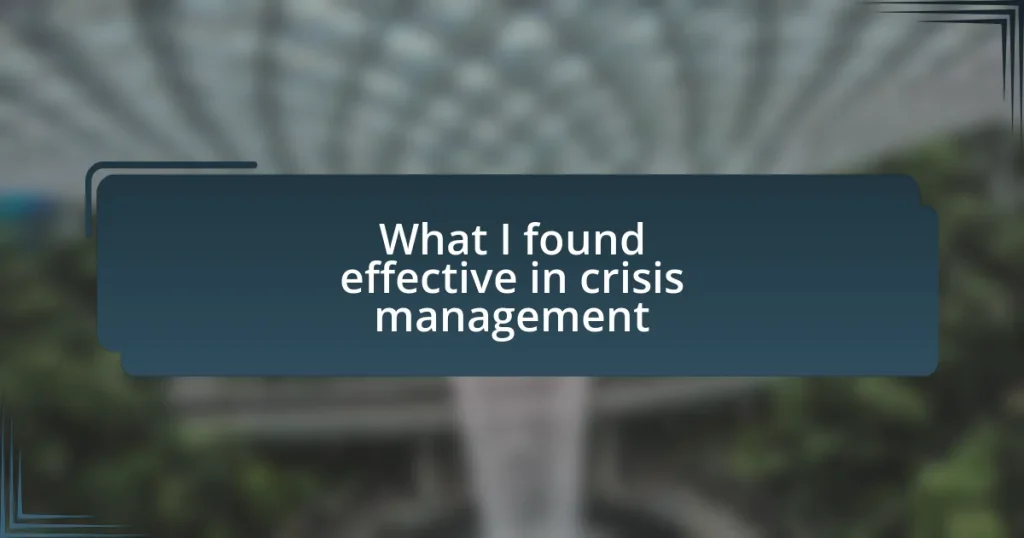Key takeaways:
- Crisis management relies on preparedness, clear communication, and flexibility to adapt to unique challenges.
- Effective communication strategies, including transparency and regular updates, are crucial for maintaining trust and control during a crisis.
- Building a diverse crisis management team with defined roles and emotional intelligence enhances effectiveness and clarity in chaotic situations.
- Post-crisis evaluation fosters organizational growth by analyzing responses and encouraging an open dialogue for continuous improvement.
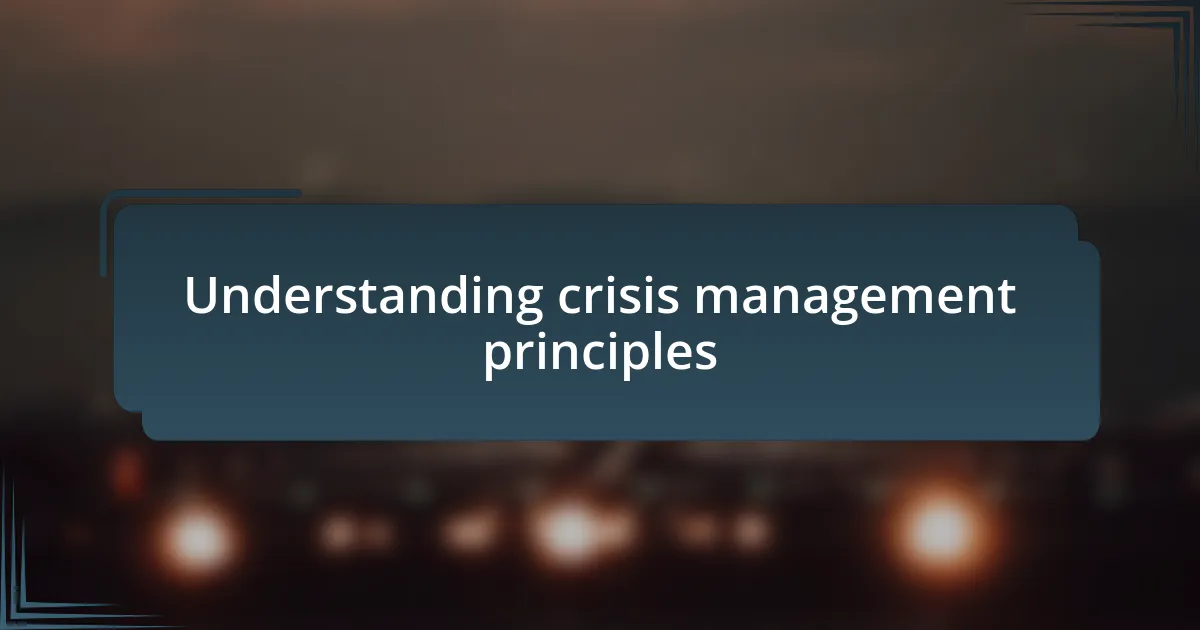
Understanding crisis management principles
Crisis management principles revolve around preparedness, response, and recovery. I recall a time when my team faced a sudden public relations crisis. We had a moment to decide how to act, and I realized that having a solid plan in place allowed us to respond quickly and effectively.
One key principle I’ve found essential is clear communication. During a particularly challenging situation, I remember gathering my team and emphasizing the importance of transparency. Have you ever experienced how calming it feels when everyone is on the same page? It not only helps in maintaining trust but also fosters a sense of unity during chaos.
Another vital aspect is the need for flexibility. In my experience, no two crises are ever the same; they each bring unique challenges and require adaptive strategies. When our organization faced unexpected regulatory changes, I quickly learned that sticking rigidly to a plan can lead to further complications. Embracing change and being willing to pivot can make all the difference in achieving a positive outcome.
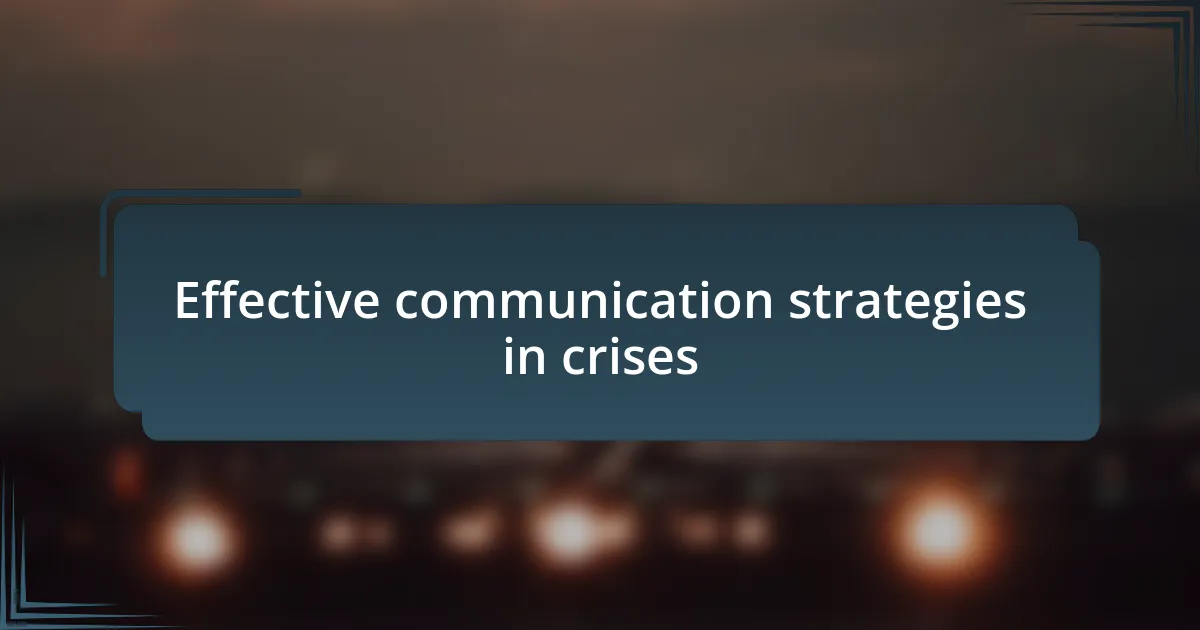
Effective communication strategies in crises
Effective communication is the backbone of successfully navigating a crisis. I remember a crisis situation in my previous role where misinformation was spreading like wildfire. I immediately set up a central channel for updates, ensuring that our message was consistent and clear. This not only dispelled rumors but also reassured our stakeholders that we were in control.
To ensure effective communication during a crisis, consider these strategies:
- Be transparent: Share what you know, even if it’s limited. Honesty fosters trust.
- Utilize multiple channels: Different audiences may prefer different platforms. I found that using emails, social media, and direct calls covered all bases effectively.
- Establish regular updates: During a prolonged crisis, I learned that offering consistent updates helped people feel involved and informed.
- Encourage two-way communication: Creating a space where feedback and questions could be voiced allowed me to address concerns directly and alleviated anxiety.
- Empower crisis spokespersons: Having designated individuals with prepared messages can streamline communication and reduce confusion.
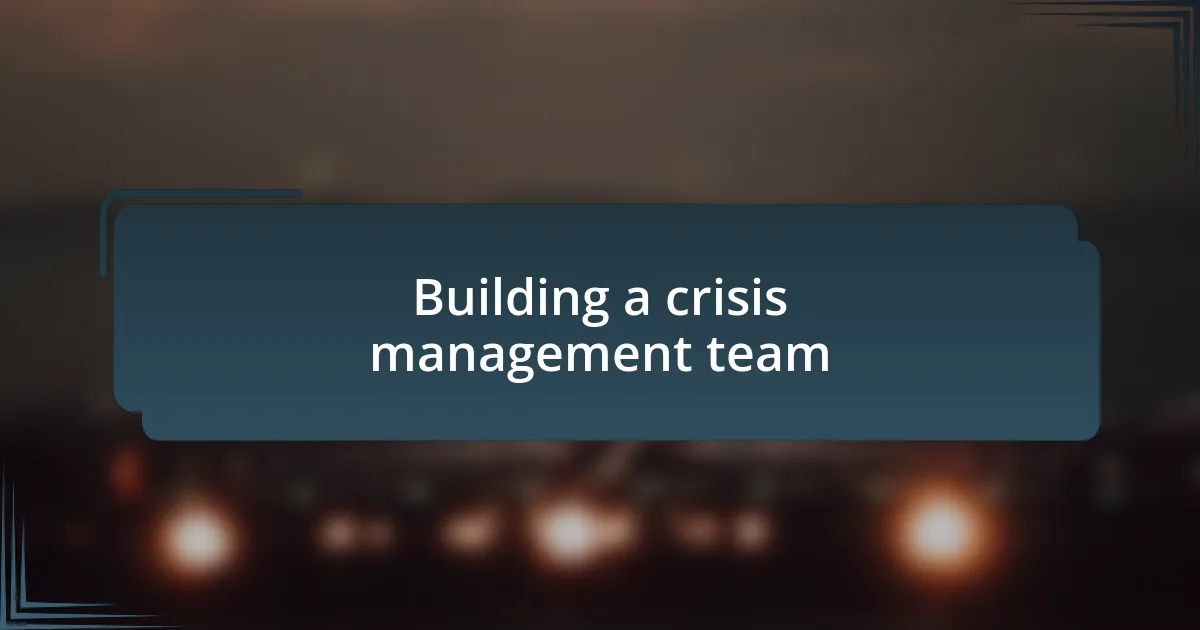
Building a crisis management team
Building a crisis management team requires careful consideration and strategic planning. In my experience, I found that selecting individuals with diverse skill sets leads to a more robust team. For instance, a blend of communication experts, legal advisors, and emotional support specialists ensures that all angles of a crisis are covered, making the team far more effective.
One significant lesson I learned was choosing team members who not only possess technical expertise but also emotional intelligence. This became clear during a crisis when our team was under immense pressure. We had a member who was not only a seasoned project manager but also had a knack for empathizing with others. Their ability to comfort and motivate us during dark times truly made a difference, reminding us that we are in this together.
Additionally, establishing defined roles within the team can provide clarity during chaotic moments. I recall a time when our crisis management plan laid out specific responsibilities, which allowed us to respond quickly and efficiently. This proactive approach minimized confusion and helped us restore order swiftly.
| Key Aspect | Importance |
|---|---|
| Diverse Skill Sets | Ensures all angles are covered |
| Emotional Intelligence | Fosters empathy and motivation |
| Defined Roles | Provides clarity during chaos |
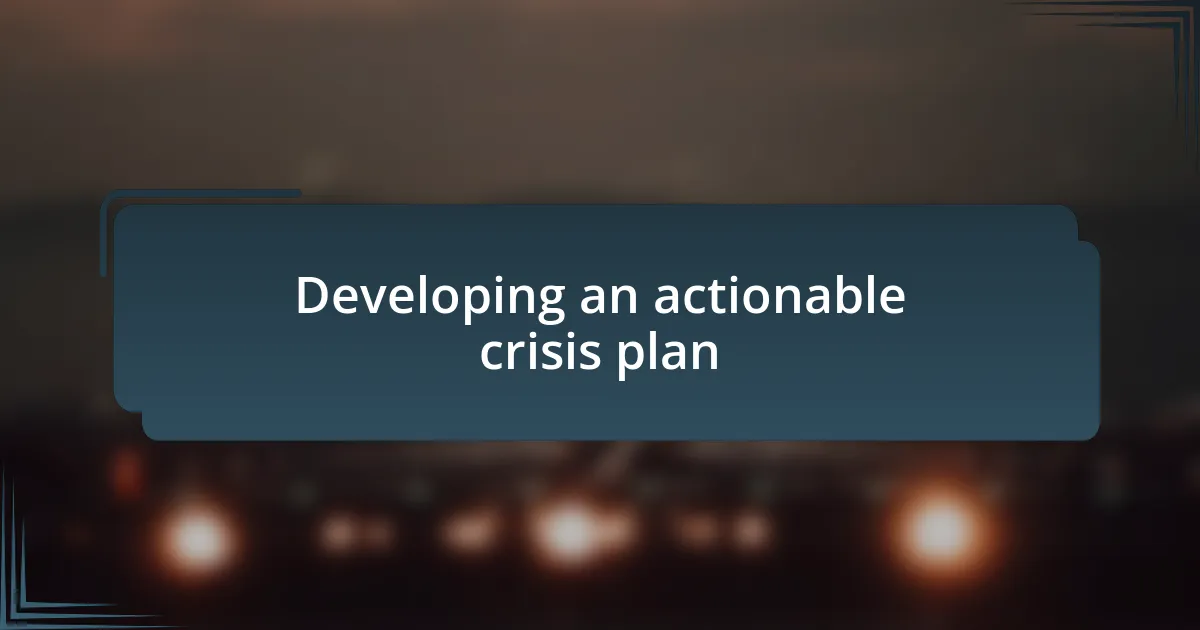
Developing an actionable crisis plan
An actionable crisis plan begins with identifying potential risks and scenarios that your organization might face. I remember conducting a risk assessment for our team, and it was eye-opening to discover vulnerabilities we hadn’t considered. This process allowed us to prioritize our responses and allocate resources effectively, ensuring we could face crises head-on when they emerged.
Next, I believe that creating a step-by-step response strategy is crucial. During a particularly challenging time when our company faced a data breach, we had a detailed checklist outlining immediate actions, from notifying stakeholders to securing systems. This clarity kept us focused amidst the chaos and proved how a well-devised plan can turn panic into purposeful action.
Finally, don’t forget the importance of regular drills and updates to your crisis plan. Reflecting on my experience, I saw firsthand how conducting simulations not only prepared us for real events but also enhanced our team’s confidence. So, ask yourself: when was the last time you practiced your crisis response? Keeping your plan dynamic and practiced ensures everyone knows their role, which is vital in the heat of the moment.
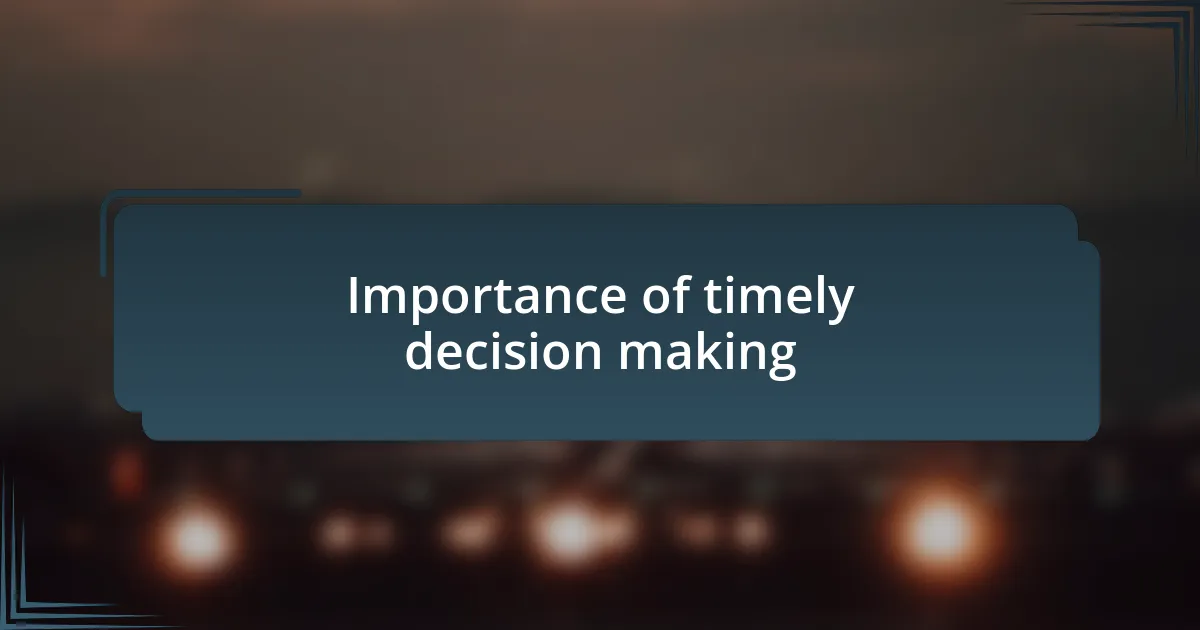
Importance of timely decision making
Timely decision-making during a crisis can often be the difference between chaos and control. I recall a moment when our team faced an unexpected operational disruption. We had mere hours to address the issue, and I learned that the urgency of making quick yet informed decisions can rally a team and restore order in what feels like complete turmoil.
In another instance, I remember observing how hesitation can breed further complications. When we faced a significant public relations incident, delaying our response only amplified negative perceptions. It was a tough lesson: the longer you wait to address a crisis, the more difficult it becomes to manage the narrative and regain trust.
Ultimately, I’ve come to believe that timely decisions empower teams to act decisively and with purpose. When pressure mounts, it’s amazing how clarity in decision-making can inspire confidence among colleagues and clients alike. Have you experienced a situation where swift action changed the outcome for the better? It’s these moments that reinforce the necessity of honing our decision-making skills in times of crisis.
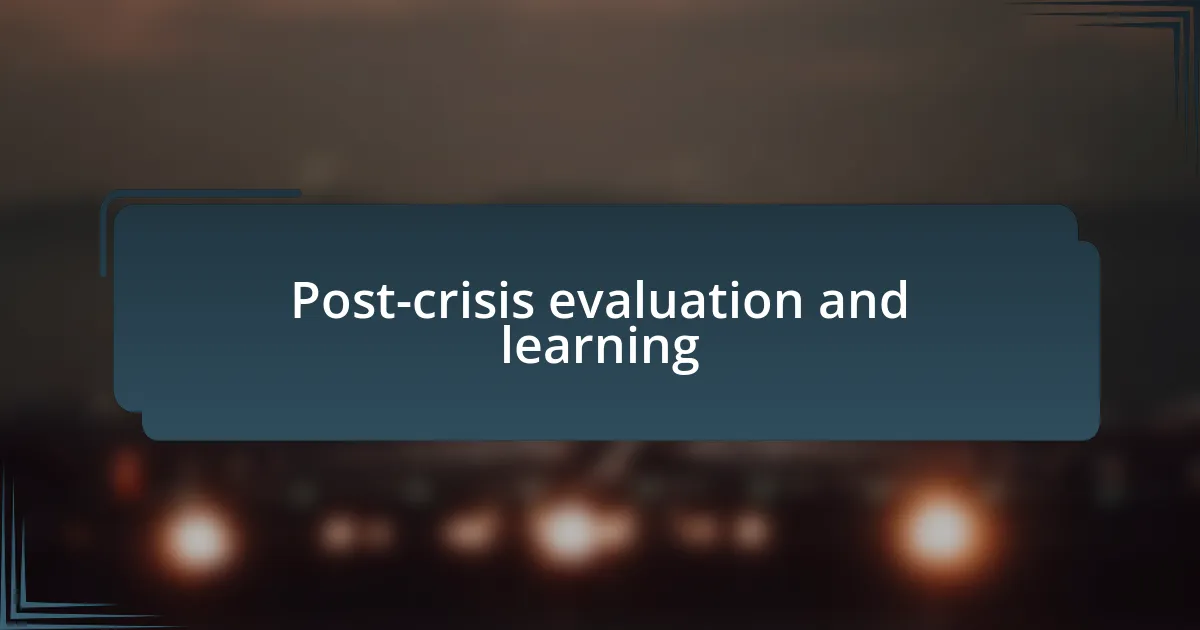
Post-crisis evaluation and learning
Post-crisis evaluation is essential for turning a challenging experience into an opportunity for growth. After one tumultuous project, I gathered my team for a debriefing session where we dissected our actions and decisions. It was fascinating to hear different perspectives; often, what I initially deemed a misstep was viewed as a valuable lesson by someone else. Don’t you think reflecting on what went wrong—and what went right—can illuminate paths for future success?
In another scenario, I was part of a post-crisis review following a major incident that impacted our reputation. I vividly remember the mix of apprehension and anticipation in the room as we shared our experiences. By encouraging open dialogue, we uncovered blind spots that I had never considered, and it struck me how crucial it is to foster an environment where everyone feels safe to express their thoughts. Have you ever been in a situation where acknowledging past mistakes led to a breakthrough in understanding?
Learning from a crisis doesn’t just improve procedures; it also shapes the culture of your organization. After analyzing our responses, we implemented training sessions focused on crisis preparedness. This experience taught me that it’s not just about surviving a crisis but evolving from it. Isn’t it empowering to know that each challenge faced can refine our skills and cultivate resilience within our teams?











